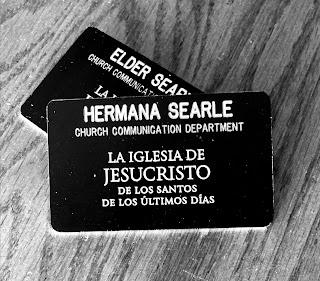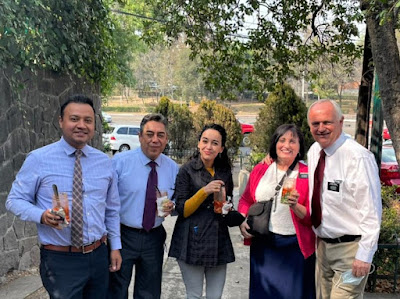Why I Am Going On A Mission
This is a the talk I gave at our farewell on September 26:
Ron and I have been called to serve a mission as
communications specialists for the Mexico area, and we leave in two weeks.
Roughly four
decades ago Ron proposed to me. At that time, we didn’t do things like couples do
now where the date is set and the temple reserved before they officially
become engaged. The first time we even discussed getting married was when Ron
proposed to me. I’m sure that was pretty intimidating for him because he had no
idea what I was going to say. As he was working up to the big question, he went
into what I can best describe as a “sales pitch” by telling me about all his
goals in life. I believe that was the first time he told me that he wanted to
one day serve a mission with his wife.
At that time
I was so head over heels in love that if he had asked me to go to Mars with him,
I would have headed to the launch pad. Also, I was very young, so it seemed
like it would be eons until we’d be old enough to go on a mission as a couple.
That made it very easy to say, “Count me in!” As the years passed, we’d often talk
about going on a mission, but the day we would be old enough to serve a mission
continued to seem ages away, so it was still always easy to say, “Yes, we are
going to go on a mission…someday.”
About a year
ago it hit me how close we were getting to “someday,”and suddenly the idea of
serving a mission got very real. I thought about all it would involve, not as
an abstract “someday” concept, but as my actual life in the very near future.
I knew Ron
wanted to request a mission in a country south of the U.S. because he served in
Peru when he was young and speaks Spanish fluently. So I knew I was probably
looking at going to live in a foreign country where, although I’ve been working
really hard at learning, I don’t speak the language very well. It would also mean living in a place I’m not
familiar with, doing things I’m not used to doing, and would probably involve a
very steep learning curve.
I thought
about all the stuff we would have to do to prepare. What would we do about our
house and our car and who would take care of our cats? What would we do about
our finances, and paying bills, and doing taxes, and how would we manage our
bank accounts and credit cards while we were away--all that practical kind of
stuff that has to be tended to.
Then there
was the emotional aspect. I knew serving a mission would mean leaving my family
behind—my children and grandchildren. We do a lot with our family, and we love
the time we spend with them. We love playing with our grandchildren and
watching them grow. I will miss them terribly. Going on a mission would also
mean leaving our friends, our ward, and our community. I feel so blessed to
have the privilege of living among all of you. Your friendship, support, and
examples have blessed my life immensely. And serving a mission would mean
leaving this community. To me, Shelley feels like a safe, sane haven in a world
that has gone crazy, and going on a mission would mean leaving that, and doing
so in the middle of a pandemic.
In other
words, what I’m saying is, I have a really wonderful cushy life. I love my
cushy life. AND I could see that going on a mission would mean walking away
from that life for a time. It sounded scary, and hard, and well outside of my
comfort zone.
So the
question is, that being how I felt, why did I go ahead and fill out a mission
application form? Why did I click that submit button on the computer, and when
the call came, why did I accept it?
The answer
to that is like what Shrek said about ogres—it’s like an onion, it has layers.
The first
layer to my answer—the thin papery outside layer—is that I have always said I
would serve a mission with my husband. It’s really important to him, and they
won’t let him go without me, so since I love him and want to be a woman of my
word, I’ll go.
That is not
a very deep reason; that’s why it’s like the thin papery, easy to pull off
layer of the onion. By itself, it would not be enough to compel me to go. But I
have to admit that there are a lot of times when that is the level I’m
functioning on—I’ve always said I’ll go, it’s always been the plan, so just
keep my head down and keep moving forward, because we are going to do this.
Now lets pull that layer off and go a little deeper. To do this, I would like to tell you about two women I’ve thought about a lot in the past few months. The first one is Camilla Dorothy Jacobsen, who
is my great great grandmother on my mother’s side. When Camilla was young, her family was well off, and she had a nice, cushy life in Denmark. Then when she was about 12 years old, she and her mother began attending meetings held by missionaries from our church. They did this in secret because her father was very opposed to the church. They would put on black cloaks and veils so they would not be recognized. In time they both they both gained testimonies of the truth of the restored gospel and were secretly baptized. But secrets don’t always stay secret. When it became known that Camilla had joined the church, she faced the bitter disappointment of her father who she loved very much. She also faced persecution at school, and not just from the other students. The teacher would encourage the other children to “kick the dirty Mormon.” Things became so bad that her parents had to take her out of school.
This
persecution did not dampen Camilla’s testimony, and at the tender age of 16, she
made what had to have been a gut wrenchingly difficult decision to leave
Denmark and her family, to cross the ocean, join a handcart company, and go to
Salt Lake--a place where, unlike everyone else in the handcart company, she had
no family or friends waiting to welcome her and take her in. She was alone. She
did this because of her strong faith and testimony, and her determination to
follow the call of the prophet to gather together in a place where she could
practice her religion among others who believed the same as she did.
The second woman I want to tell you about is Rebecca Englesby Olin King, whois my great great great grandmother on my father’s side. She and her husband, Thomas Jefferson King, joined the church in September of 1830, just five months after it was organized. They went through many of the trials heaped on the early church members, and eventually moved with the church to Illinois.
They bought
a farm at Morley’s settlement just outside of Nauvoo. But then the persecution which
had driven the church out Ohio and Missouri came to Illinois. After the
martyrdom of the prophet Joseph Smith, the persecution intensified, and
anti-Mormon mobs began roaming the countryside outside of Nauvoo.
One of these
mobs came to Rebecca’s door and demanded that she and her family leave
immediately. Thomas was too sick at the time to be of any help, so she moved
some of their furniture into the cornfield and loaded what she could into the
family’s small, one-horse wagon. Then the family all climbed into the wagon,
and as they drove away, the mob set fire to their home. The family found refuge
at a house in Nauvoo which was already occupied by three other families.
Then despite
being warned that it was dangerous to do so, Rebecca took her twelve-year-old
son, Alma, and went back to the farm to get their furniture out of the
cornfield. As they did so, Rebecca looked at all that ripe corn and realized
she had nothing to feed her children. After taking the furniture to Nauvoo, she
and her son returned to the farm to pick corn. This time, the mob saw them there
and began shouting threats. Rebecca called back to them that she had no food
for her children and she had to have the corn. This did not appease the mob,
and they began threatening to shoot her if she did not leave.
I do not
know how tall Rebecca was, knowing the King descendants I would guess not very,
but I imagine her pulling herself up to her full height, whatever it was, as
she replied to these thugs. She told them to go ahead and shoot if they were
going to because she would prefer that to starving.
This courage
seems to have set back the mob a bit, because Rebecca and Alma were able to finish
filling their wagon. They took the corn into Nauvoo and then returned to the
farm again to pick more. This time, one of the men from the mob came over to
them, put a gun to Rebecca’s chest, and told her he would personally shoot her
if she returned again. After that load, Rebecca thought they had enough corn,
so they did not return.
Her son,
Thomas Franklin King, who is my great great grandfather, was just a small child
at that time. In his life history he wrote:
“The first recollection I have in this life is was the
parching of this same corn that my mother risked her life to get for the
sustenance of her children. The corn was parched and ground into flour in our
coffee mill and was eaten with milk on our journey westward.”
Both Camilla
and Rebecca were strong women who were called upon to do hard, scary things
that I’m sure were well outside their comfort zones. Because of their
testimonies, they faced those challenges valiantly. I am aware that their faith and courage helped
to build the foundation of the cushy life that I now get to live.
As I’ve
thought about my great grandmothers and their sacrifices, I’ve asked myself “how
will I ever live up to the heritage they left for me if I’m not also willing to
step outside of my comfort zone and do hard things for my faith and testimony.”
This leads
to the next layer, the deepest layer of my onion, the core of why I’m going to
serve a mission, and that is my testimony of, faith in, and gratitude to my
Savior Jesus Christ. His atonement and gospel have blessed my life in too many
ways to recount. Because of Him, I am able to live a life filled with peace and
hope in a world that offers little of either of those things.
I don’t kid
myself into thinking that by serving a mission I can in anyway or to any degree
“pay back” the debt I owe to Christ. King Benjamin in the book of Mosiah taught:
“I say unto you that if ye should serve him who has created you from the beginning, and
is preserving you from day to day, by lending you breath, that ye may live and move and do according to your
own will, and even supporting you from one moment to another—I say,
if ye should serve him with all your whole souls yet ye would be unprofitable servants.”
(Mosiah 2:21)
He goes on
to say that all the Lord requires of us is to do as He asks and whenever we do
that, He immediately blesses us for doing so, so we can never get out of debt
to Him.
I’ve
experienced how generous the Lord is in showering blessings in return for my
meager efforts to be His follower. I am counting on those blessings to help me
as I serve a full-time mission and to bless and care for my family while I am
away.
I have
already felt some of those blessings during the past few months as we’ve gone through
the application process and received our mission call, and now as we’ve been
preparing. One way I’ve seen those blessings has come as I’ve read the
scriptures, several times I have had words that had a footnote mark on them
stand out to me. I’ve gone to those footnotes and they’ve led me to other
scriptures that have been just what I’ve needed at that time.
One in
particular came right after we got our call, and I was feeling very
apprehensive about my ability. The footnote I turned to led to Joshua 1:5, “As
I was with Moses, so I will be with thee: I will not fail thee, nor forsake
thee.”
Even though
the Lord was speaking to Joshua in that verse, but we are told we can liken all
scriptures to ourselves, and as I read those words, it was if the Lord was
speaking to me and promising to be with me as I serve. I have no doubt He will
be able to magnify my efforts, and for that knowledge, I am very grateful.
As I thought about how to express my
feelings and testimony, the words of Charles H. Gabriel came to me. He wrote a
hymn I’m sure you are familiar with, and which expresses my feelings
beautifully. So as my testimony, I am going to borrow his words.
I stand all amazed at the love Jesus offers me,
Confused at the grace that so fully he proffers me.
I tremble to know that for me he was crucified,
That for me, a sinner, he suffered, he bled and died.
I marvel that he would descend from his throne divine
To rescue a soul so rebellious and proud as mine,
That he should extend his great love unto such as I,
Sufficient to own, to redeem, and to justify.
I think of his hands pierced and bleeding to pay MY debt!
Such mercy, such love and devotion can I forget?
No, no, I will praise and adore at the mercy seat,
Until at the glorified throne I kneel at his feet.
Oh, it is wonderful that he should care for me
Enough to die for me!
Oh, it is wonderful, wonderful to me!
(“I Stand All Amazed”, Hymns of
the Church of Jesus Christ of Latter-day Saints, Hymn #193)
I have felt the comfort and influence of the Spirit frequently in the past few months. I can now say that although I’m still a little nervous, I am excited to serve the Lord as a missionary and to do my small part in helping to build up His kingdom here on earth.






Comments
Post a Comment